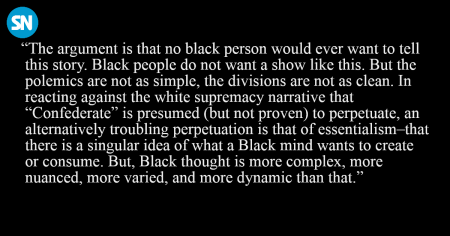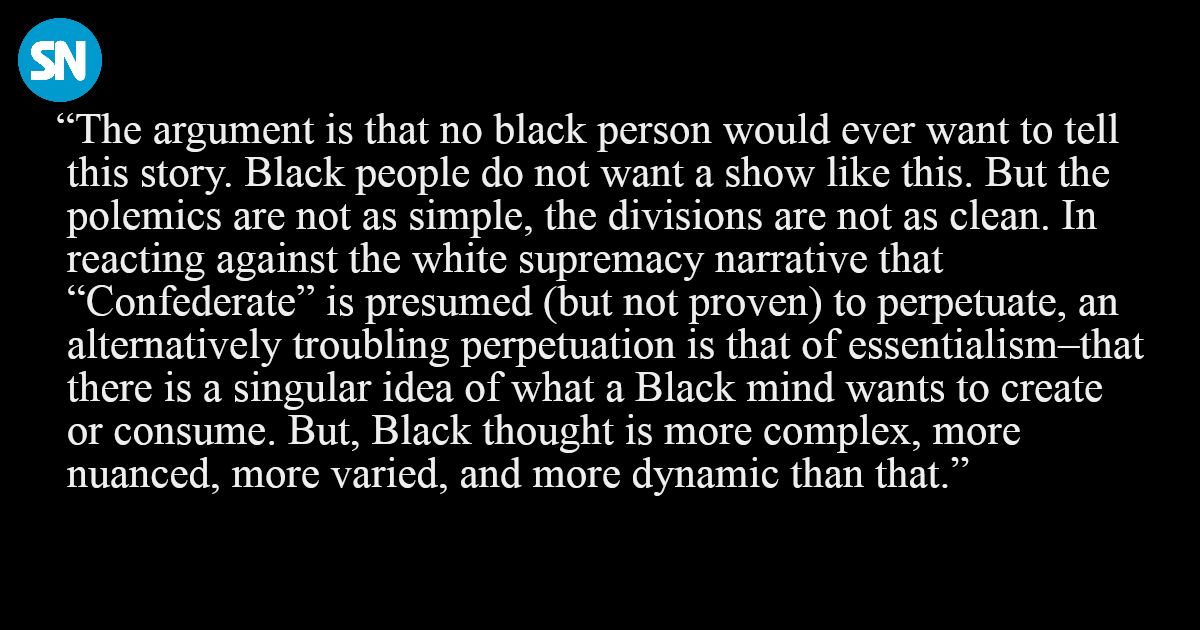In mid-July, HBO released a brief press release about “Confederate,” an upcoming show from David Benioff and D.B. Weiss, the creators behind the “Game of Thrones” series.
“Confederate” will explore an alternate American reality where southern states have successfully seceded from the Union. In this alternate world, there is a nation where slavery remains legal. “Confederate” covers a Third American Civil War covering the lives of freedom fighters, slave hunters, politicians, abolitionists, journalists, the executives of a slave-holding conglomerate and the families of people in their thrall.
In the weeks since this release, the show has been indicted as slavery fan-fiction, white nonsense, stupid, ugly, and dangerous.
Benioff and Weiss and their co-producers (husband and wife team of Malcolm and Nichelle Spellman) have been hit with arguably the most emphatic disavowal of a show that has not gone into production. The swath of criticism against “Confederate” has been in reaction to two things. The first was the 400-word press release, a quarter of which maps out the show’s basic premise. The second is the professional history of two of its four co-producers, and the inability (thus far) of “Game of Thrones” to properly grapple with issues of race. Extended critiques from notable Black critics – Roxane Gay, Ta-Nehisi Coates, Ira Madison, or short form ones on Twitter have judged the show and found it wanting. April Reign, Black activist and public speaker, launched the Twitter hashtag #NoConfederate, which was the second most trending hashtag on Twitter during a late July showing of “Game of Thrones.” The reaction has been swift and decisive–“Confederate” is an insult to the Black community, a rehashing of harmful or destructive ideas, and cannot be encouraged.

“Confederate” has not been created. The procreation process has merely just begun.
When you think that something is dangerous, you will do all that is necessary to destroy it. And that’s what happening with “Confederate.” Many pieces on “Confederate” acknowledge the hypothetical reasons why criticising an idea are troublesome and then proceed to do just that, using the danger of the premise as the reason for it. Until the show is released, there can be no firm repudiation of the show and no firm confirmation of its necessity or its goodness.
There can be no truly PRO “Confederate” stance because as of now there is no “Confederate” to critique. There can only be an anti #NoConfederate argument. The fall-out from the “Confederate” situation has only made me ponder further on the role of the critic in the age of social media. It’s made me even more troubled about the state of cultural criticism in the time of Trump’s presidency. Addressing Trump and the world’s (particularly America’s) fraught racial politics currently always feels overzealous from a Caribbean perspective, except that our interaction with digital media in this part of the world is still contingent on our relationship with the U.S. and, to a lesser extent, Europe and Canada. The election of Trump has calcified the harshness of America for non-white constituents, and that calcification has made us sensitive. Undoubtedly and understandably. Trump’s rise in the U.S. and the identity politics of the Brexit results both display the clear-eyed fulsomeness of a world where race is an issue and the lives of non-white persons in whiter parts of the world are under siege. Media narratives which uphold whiteness problematise the situation. Media narratives that uphold whiteness that trickle down to the non-white Caribbean are problematic in different ways. But Trump’s influence, and the prickly sensitivity of those potentially under siege, cannot–ought not–give way to a knee-jerk disavowal of the tenets of criticism. The conflation of all who do not support #NoConfederate as proof of a pro-slave porn stance is not just troubling but indicative of the sort of broad estimation without curiosity or investigation that threatens to harm our interactions with those who do not look like us. Or sound like us.
I find myself troubled by the argument of commentators who argue that HBO encouraging the #NoConfederate movement to wait and see before making judgements is disingenuous because HBO made a critical judgement when it accepted the show. And HBO makes critical judgements when it refuses to accept certain pitches. But that argument is disingenuous. When a network or a producer passes on an idea, it is not the same as launching a cultural critique to say that that idea should not be made, or should not be supported.
A culture of scepticism before a media object has been created is the trouble here. And using scepticism before product as criticism is what troubles me. Writers writing online know the difficulty of producing criticism in this age. The reaction becomes to the title of the article or the by-line; few read the entire piece before they launch into argument. Criticism, investigation, and analysis are all under siege and endemic of the Presidency-by-Tweet of the American administration. Earlier this week, Vulture released an article on the toxicity of the Young Adult Literature world. The story stemmed from a virulently negative review of The Black Witch, which Shauna Sinyard, a prominent YA critic (on Twitter at least), lambasted in a 9000-word (!) review. The novel depicts, but does not endorse, negative characters, including white supremacists. The situation reaches destructive heights to the point that anyone who dared to read this novel was accused of perpetuating racist ideals. Critics and audiences were to take Sinyard’s critique at face value otherwise they would be perpetuating a culture of ableism. What’s the relationship between this and “Confederate”? It’s that the conflation of anti-#NoConfederate arguments with a love for slavery fan fiction moves the needle in a harmful way. This is not about giving potentially troublesome or harmful racist narratives the benefit of the doubt, but about displaying intellectual and aesthetic curiosity towards images and words. And that leads to the most troubling aspect of this entire scenario. For, did I mention that the husband/wife quartet attached to “Confederate” are Black? In a recent reaction to the criticism, Malcolm Spellman said, “If you render us a footnote, the assumption is that we’re just a prop or a shield…Our own people marginalised us like that.” So much of the criticism of the show has merely passed over their involvement. The Spellmans’ presence was rendered incidental or peripheral at best. The noise on Twitter (where the most complex of arguments, unfortunately, come to die) was about their Black-credentials, about their prospective complicity in white supremacy narratives, about the way they were merely footnotes to foster a white vision. It’s not enough that Benioff and Weiss have brought on this pair of Black writers, the arguments posited. They were there for the optics, or as shields, was the implication. The argument is that no Black person would ever want to tell this story. Black people do not want a show like this. But the polemics are not as simple, the divisions are not as clean. In reacting against the white supremacy narrative that “Confederate” is presumed (but not proven) to perpetuate, an alternatively troubling perpetuation is that of essentialism–that there is a singular idea of what a Black mind wants to create or consume. But, Black thought is more complex, more nuanced, more varied, and more dynamic than that. Black expression, or expression from any race, gender or sexual orientation, resists the idea that there is a single or singular mode of argument.
Good art, like good criticism, should be primarily interested in encouraging more conversation not in shutting down modes of communication or expression. “Wait and see” may sound like cowardly coddling, but if we cannot be curious about images and wait until full investigation to launch an assault as a critic, then we reveal our genuine lack of interest in criticism.
Have a comment? Write to Andrew at almasydk@gmail.com

